
Malayalam cinema is the segment of Indian cinema dedicated to the production of motion pictures in the Malayalam language, which is widely spoken in the state of Kerala and Lakshadweep islands of india. Malayalam cinema includes the commercial film industry, sometimes known as Mollywood, as well as independent cinema made in Malayalam.
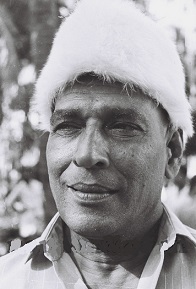
Balakrishnan Nair, more popularly known as Balan K. Nair was an Indian actor known for his roles in Malayalam cinema. Although he appeared as a villain in most films, he was also noted for his performances in strong character roles. He emerged as one of the top villain of Malayalam cinema in the second half of the 1970s and played some of the best villain characters in Malayalam films during that period. He won the National Film Award for Best Actor in 1981 for his performance as Govindan in the film Oppol.
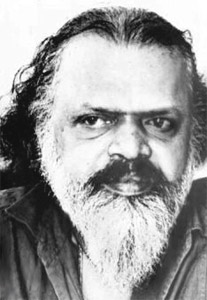
Govindan Aravindan was an Indian film director, screenwriter, musician, cartoonist, and painter. He was one of the pioneers of parallel cinema in Malayalam. He was known for his unorthodox way of filmmaking; he changed his cinematic forms consistently and experimented in storytelling without regular narrative styles.

Karuvattu Mana Vasudevan Namboothiri, better known as Artist Namboothiri or simply Namboothiri, was an Indian painter and sculptor, known for his line art and copper relief works. He illustrated for many Malayalam writers such as Thakazhy Shivasankara Pillai, Kesavadev, M. T. Vasudevan Nair, Uroob, S. K. Pottekkatt, Edasseri Govindan Nair, and V.K.N., and was one of the most prolific literary illustrators of India. He was also a chairman of the Kerala Lalithakala Akademi. The Akademi awarded him the Raja Ravi Varma Award in 2003. He was also a recipient of the Kerala State Film Award for Best Art Director.
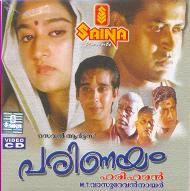
Parinayam is a Malayalam language period drama film, directed by Hariharan and written by M. T. Vasudevan Nair. The key characters are played by Mohini, Manoj K. Jayan and Vineeth. The film also has a cast of character artists including Thilakan, Nedumudi Venu, Oduvil Unnikrishnan, Jagathy Sreekumar, Sukumari, Jagannatha Varma, Valsala Menon, Bindu Panicker, Bahadoor, and Shanthi Krishna.
P. Kunjanandan Nair, better known by his pseudonym, Thikkodiyan, was an Indian playwright, novelist, lyricist and screenwriter of Malayalam. He was known for his contributions to the genre of radio plays and his autobiography, Arangu Kaanatha Nadan, which detailed the socio-cultural development of Malabar in the post-independent period, fetched him a number of awards including the Kendra Sahithya Academy Award, Kerala Sahitya Akademi Award for Biography and Autobiography, Vayalar Award and the Odakkuzhal Award.
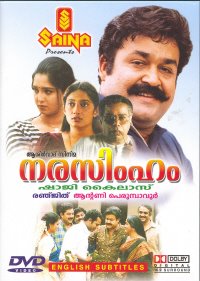
Narasimham is a 2000 Indian Malayalam-language action drama film directed by Shaji Kailas and written by Ranjith. Narasimham was released on 26 January 2000, India's 50th Republic Day, and ran for 200 days in theatres and grossed over 20 crores worldwide, which at time was a record in the Kerala Box Office. The film stars Mohanlal in the title role with Thilakan, Kanaka, N. F. Varghese, Aishwariyaa Bhaskaran and Jagathy Sreekumar in pivotal roles. Mammootty appears in a cameo role. The film was the first production of Aashirvad Cinemas, owned by Antony Perumbavoor, the former chauffeur of Mohanlal.
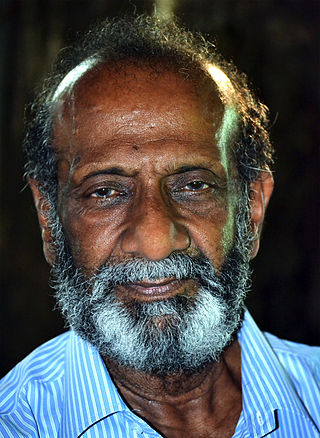
T. G. Ravindranathan, popularly known as T. G. Ravi, is an Indian actor, mainly noted for his roles as a villain in Malayalam cinema. He along with Balan K. Nair played most of the negative roles in Malayalam cinema during the 1970s and 1980s. Known for his body language and style of dialogue delivery, he played some of the biggest villain roles in Malayalam cinema during that period.
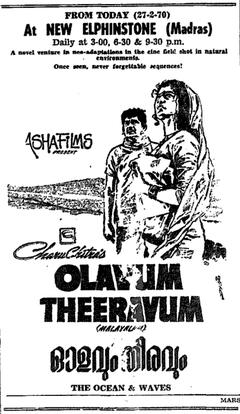
Olavum Theeravum is a 1970 Indian Malayalam-language drama film directed by P. N. Menon, written by M. T. Vasudevan Nair, and produced by P. A. Backer. It stars Madhu and Usha Nandini, with Jose Prakash, Philomina, and Nilambur Balan in supporting roles. The film has a musical score by M. S. Baburaj. Cinematography was done by Mankada Ravi Varma.
Pattathuvila Karunakaran (1925–1987) was an Indian film producer and short story writer of Malayalam literature. He was best known for his book, Vimarsham and for his association with the film, Uttarayanam, the directorial debut of noted filmmaker, G. Aravindan, as the film's producer and story writer. Kerala Sahitya Akademi awarded him their annual award for story in 1972.
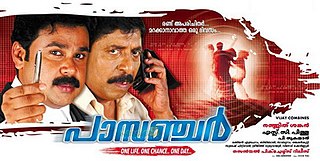
Passenger is a 2009 Indian Malayalam-language conspiracy thriller film written and directed by debutant Ranjith Sankar and starring Sreenivasan, Dileep, Mamta Mohandas, Jagathy Sreekumar and Nedumudi Venu in major roles. It was a path breaker in Malayalam cinema in terms of its story telling and started the Malayalam new cinema wave. Owing to its critical and commercial success, Passenger was to be remade into Tamil as Muriyadi by Selva.
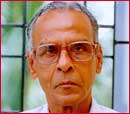
Mankada Ravi Varma was an Indian cinematographer and director who worked in Malayalam cinema. He is exclusively known for his association with renowned film-maker Adoor Gopalakrishnan. He has associated with other major directors such as G. Aravindan and P. N. Menon. He has also directed two films. He has won two National Film Awards and seven Kerala State Film Awards in various categories. In 2006, he was honoured with the J. C. Daniel Award, Kerala government's highest honour for contributions to Malayalam cinema.
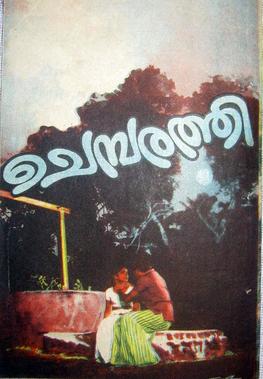
Chemparathy (transl. Hibiscus) is a 1972 Malayalam-language film directed by P. N. Menon and written by Malayattoor Ramakrishnan. It was produced by S. K. Nair, a famous literary personality and the founder of Malayalanadu weekly. It stars Madhu along with newcomers Roja Ramani, Raghavan and Sudheer in major roles. The film was an adaptation of Malayattoor's short story Lodge. Noted filmmaker Bharathan made his cinematic debut as an art director in the film.
Ore Thooval Pakshikal is a 1988 Malayalam film written, directed and produced by Chintha Ravi. The film, in a docu-drama style, depicts the last days of the British Raj. It stars Balan K. Nair, Tom Alter, Nilambur Balan and Ramachandran Mokeri in pivotal roles. The film features an original score composed by legendary filmmaker G. Aravindan.
Sreeja Ravi is an Indian voice artist who has lent her dubbing voice to over 2000 films in total and also performed voices for numerous commercial ads. She started her dubbing career in the year 1975 for the movie Uttarayanam, directed by G. Aravindan. She is the winner of four time Kerala State Film Award, one Tamil Nadu State Film Award and two Kerala Film Critics Awards for dubbing.
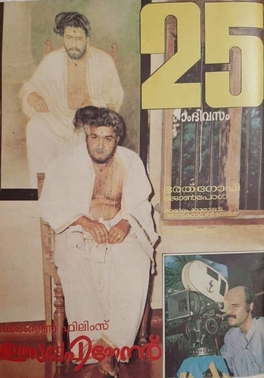
Ulsavapittennu is a 1988 Indian Malayalam-language drama film directed by Bharath Gopi and written by John Paul. The film stars Mohanlal, Parvathy Jayaram, Jayaram, and Sukumaran in the lead roles. The film has musical score composed by G. Devarajan.












